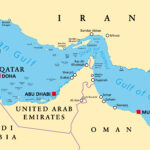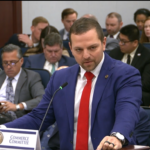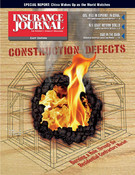The torching of financier Martin Frankel’s $3 million mansion in Greenwich, Conn., was meant to destroy evidence of an insurance scam that cost Mississippi and other states millions, police said. But not everything went up in flames.
Firefighters searching the rubble found Frankel’s pornographic videos, jewel-encrusted mobile phones, OuIJa board and a “Things to Do List” on which No. 1 was “Launder more money NOW.”
The financier, who initially fled to Europe, came to Mississippi and pleaded guilty in 2002 in Mississippi to stealing $208 million in five states, including Oklahoma.
But that did not end the case for Mississippi Insurance Commissioner George Dale. While unraveling Frankel’s web of trickery, Dale found a thread that led into the secretive halls of the Vatican. And he is determined to follow it, even though, as he said, “This step meant some soul searching.”
In a lawsuit Dale filed, which is in U.S. District Court in Jackson, Miss., he claimed Vatican officials violated the federal Racketeer Influenced and Corrupt Organizations (RICO) Act. Damages, if Dale prevails, could be more than $600 million.
Vatican denies profiting
The Vatican denies the Roman Catholic Church profited from business dealings with Frankel or accepted funds he stole. The church has filed a motion to dismiss the suit for lack of jurisdiction; a ruling is expected this summer.
Dale remains determined to pursue his suit against “The Holy See aka Vatican City State” and others. “The evidence of wrongdoing my investigators accumulated was so clear,” he said. “State officials are always slammed as paper pushers. But two federal agencies fumbled the ball with Frankel. The Internal Revenue Service approved Frankel’s taxes. The FBI had suspicions but made no moves. In the end, insurance commissioners brought this guy down.”
Just days before Frankel’s mansion burned in 1999, he and his associates were summoned by Dale to Jackson to discuss a possible tie between Vatican officials and the insurance scam. Frankel didn’t show.
Those who did appear and were questioned included Thomas Bolan, a former New York prosecutor and fundraiser for the Republican party and the Catholic Church; Monsignor Emilio Colagiovanni, a member of the board that provides the pope’s legal counsel; and the Rev. Peter Jacobs, a New York priest who was also a Vatican insider.
Bogus Catholic charity
The scam that threw these unlikely antagonists together began in 1998 when Frankel formed a bogus Catholic charity, the St. Francis of Assisi Foundation, with $55 million. The Vatican got $5 million of the seed money, according to court documents. Colagiovanni agreed to oversee St. Francis and vouch for it with investors. Frankel would control the remainder of St. Francis funds. He used the money to buy financially desperate insurance companies, then spent policyholders’ money on drugs, diamonds, sex clubs, vacations, cars, call girls and Concorde tickets, prosecutors said.
The Vatican became involved with Frankel after he had been banned by the U.S. Securities and Exchange Commission from doing deals with brokers and investment advisers. The 1992 ban forced Frankel on a quest for new partners with prestige and deep pockets.
By 1998, Frankel had an entree to the Vatican: Bolan. A fervent Catholic and Roy Cohn’s ex-law partner, Bolan, now 79, had raised millions for Vatican charities and Ronald Reagan’s re-election campaign. Frankel paid Bolan more than $75,000 in legal fees, court documents show. In return, Bolan introduced Frankel to influential priests like Jacobs and the Vatican economic affairs prefect Bishop Francesco Salerno.
Pitching the St. Francis project to Salerno, Jacobs and Bolan allegedly said Frankel would control the bulk of the money, but his involvement would remain hidden. A Vatican official would head St. Francis, and the Vatican would get a cut of the proceeds for its trouble.
Colagiovanni, 83, supervised St. Francis on Frankel’s behalf. Colagiovanni also supervised Monitor Ecclesiasticus, a canon law review distributed globally to bishops and cardinals. The publication offered a special advantage for Frankel. As a non-Catholic, he could not open a Vatican Bank account, but Monitor Ecclesiasticus did have an account. When Frankel had money he didn’t want the IRS to count, he would wire it to the law review’s account. Frankel flew Vatican officials by Concorde to his Connecticut mansion to complete details. Dale claims that Salerno approved the arrangement. Responding to requests for comment from Salerno, the Vatican Press Office said, “There is a trial under way. The trial continues and we are not interfering.”
Insurance company officials in Tennessee, Mississippi, Arkansas, Missouri and Oklahoma were targeted by Frankel. When some of the firms’ executives got jumpy about their prospective new owner, Colagiovanni reassured them, the complaint said, and sometimes gave them personal tours of Vatican City.
By the end of 1998, Frankel was funneling $434 million in bogus insurance company policies through St. Francis.
Following the 1999 session in Jackson, Dale demanded that the St. Francis representatives return $200 million worth of reserve assets to the Mississippi insurance companies. The insurance companies went bankrupt days later. Mississippi’s guaranty fund picked up the tab for claims filed by Frankel’s policyholders. Ignoring Dale’s summons, Frankel skipped the meeting.
In 2002, both Frankel and Colagiovanni pleaded guilty to fraud in Mississippi court. At his trial, the elderly priest admitted that he lied to insurance company honchos, telling them that the Vatican transferred $1.2 billion to St. Francis for investments. No such sum ever made it to insurance company reserves.
Meanwhile, Dale continued tracing the paper trail that led them to sue the Vatican bank in 2001. Insurance commissioners from Missouri, Tennessee, Oklahoma and Arkansas have joined the Mississippi suit.
Though the church insists it did not profit from St. Francis, that may be beside the point. “We are not claiming that the Vatican profited,” said Charles Copeland, local counsel for the Mississippi Insurance Commission. “If a party should have reasonably been aware that those involved in a conspiracy were committing illegal acts in the party’s name, that party can be held responsible for the amount stolen,” he explained.
Copyright © 2004, The Associated Press
Topics Carriers Oklahoma Connecticut Mississippi
Was this article valuable?
Here are more articles you may enjoy.


 Marine Insurers Cancel War Risk Cover as Iran Conflict Escalates
Marine Insurers Cancel War Risk Cover as Iran Conflict Escalates  Florida OIR Slams Committee-Approved Clearinghouse Bill Changes as ‘Illusory’
Florida OIR Slams Committee-Approved Clearinghouse Bill Changes as ‘Illusory’  Zurich Insurance and Beazley Agree to $10.9B Cash Acquisition
Zurich Insurance and Beazley Agree to $10.9B Cash Acquisition  Meta Loses Insurance for Defense in Major Social Media Addiction Litigation
Meta Loses Insurance for Defense in Major Social Media Addiction Litigation 


